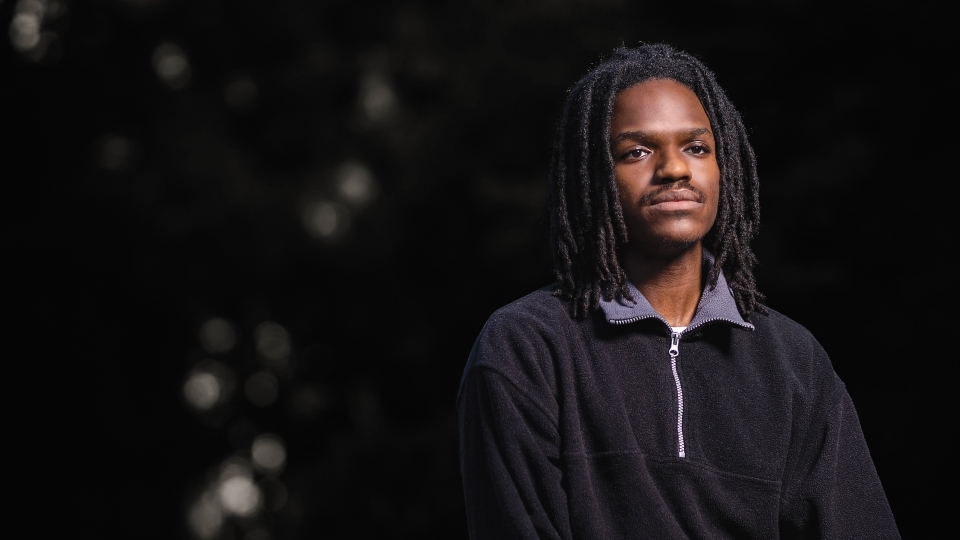Collective Memory: Surfacing Stories of Black Alumni and Students
February 8, 2021
- Author
- Mary Elizabeth DeAngelis

Maurice J. Norman ’20, Stories (Yet) to be Told: Race, Racism and Accountability on Campus Digital Projects Fellow
In 1981, Davidson College’s Black Student Coalition wrote a statement protesting a fraternity’s annual “Old South” weekend. It said the fraternity’s national tradition, with the men in the suits and their dates in the hoop-skirted dresses of antebellum days, glorified a time that enslaved and oppressed Black people.
“Because of the past 200 odd years of white racism and the present white racism experienced by Blacks,” the statement said, “the feelings of anger, anguish, hate and hurt will always exist…when symbols of white racism exist.”
The fraternity agreed to move the event off campus; and eventually stopped having it. The story is one of many in college archives that documents the concerns of Black students at Davidson through the years. Another, from a 1984 Black student initiative called Project ’87, offers this assessment: “Our continuing disorientation and feelings of alienation have given us reason to question seriously the extent of Davidson’s commitment to making this a healthy environment for all students.”
While the college Archives, Special Collections, and Community department collects and preserves records containing stories of Black students’ lives at Davidson, many remain untold, or largely unknown.
That’s changing, thanks to “Stories (Yet) to be Told: Race, Racism and Accountability on Campus.” The two-year initiative will include transforming important campus spaces into interactive areas to explore issues of race and racism. Those spaces will include buildings, virtual sites, performances, lectures and courses. The $250,000 grant was awarded to President Quillen as a presidential leadership grant in December 2019 by the Andrew W. Mellon Foundation.
Maurice J. Norman ’20, a writer, poet and the first Stories digital projects fellow, is helping to advance the college’s storytelling efforts. He’s been a key member of the Stories initiative team, which seeks to strengthen Davidson’s archives through the narratives of its Black students, faculty, staff and alumni.
As an undergraduate, Norman launched an oral history venture, “Project: Token,” a multi-media art installation to amplify the voices of Black, Indigenous and other students of color. The students contributed photos, art and words about their Davidson experiences. He now supports and develops all aspects of the Stories initiative, from communications to working with grant recipients.
Stories will include student, staff and faculty projects in archival oral history and photography, and initiatives, such as “Inclusive Histories at Davidson College” and the “Davidson Microaggressions Project.”
The archives will support research underway now, including some from Vann Professor of Ethics in Society Hilary Green’s Africana Studies class. Green and students have been researching the lives of enslaved people at Davidson. Norman audits the class to learn more of their untold stories.
“When talking about Stories, we must return to the very beginning,” Norman says. “We must revisit the archives to bring those stories to the forefront. All of this is going to be important in curating a collective Black memory. How can we amplify the past and co-create the future?”
Jessica Cottle, the Justice, Equality and Community (JEC) archivist and another key person on the Stories initiative, has been gathering and digitalizing documents ranging from the admission of the first Black students in the 1960s to the BSC’s initial charter statement in 1972 to student thesis projects about race.
Cottle says this year’s events—the COVID-19 pandemic and the police killings of George Floyd in Minneapolis and other Black people around the United States—inspired calls from Black alumni who wanted to talk about their time at Davidson.
The idea for the oral history project was born.
“There is more than one story, and we need to understand that there are going to be conflicting memories of things,” Cottle says. “That’s valid, and we need to make sure all of those perspectives are represented in a respectful way.”
Norman has begun interviewing alumni from different eras. Some have reached out to him; he’s been connected to others by Yolanda Gilliam, assistant director of alumni and family engagement.
“Yolanda has been a rock through this entire process, she’s been so helpful.”
“My hope is that the work will be continued after the grant ends,” Norman says.
The project will carve out a digital space centered around Black people and people of color so that their stories can be passed down to future Black students.
“This isn’t just about listening,” he says. “This is about applying what we’ve learned to create an antiracist future.”
The Stories (Yet) to be Told: Race, Racism and Accountability on Campus website is a growing prototype, with projects and content continually being added. It will not be complete until the end of the two-year initiative. For more information, please follow s.y.t.b.t on Instagram or contact Digital Projects Fellow Maurice J. Norman ’20 at manorman@davidson.edu.
This article was originally published in the Fall/Winter 2020 print issue of the Davidson Journal Magazine; for more, please see the Davidson Journal section of our website.



